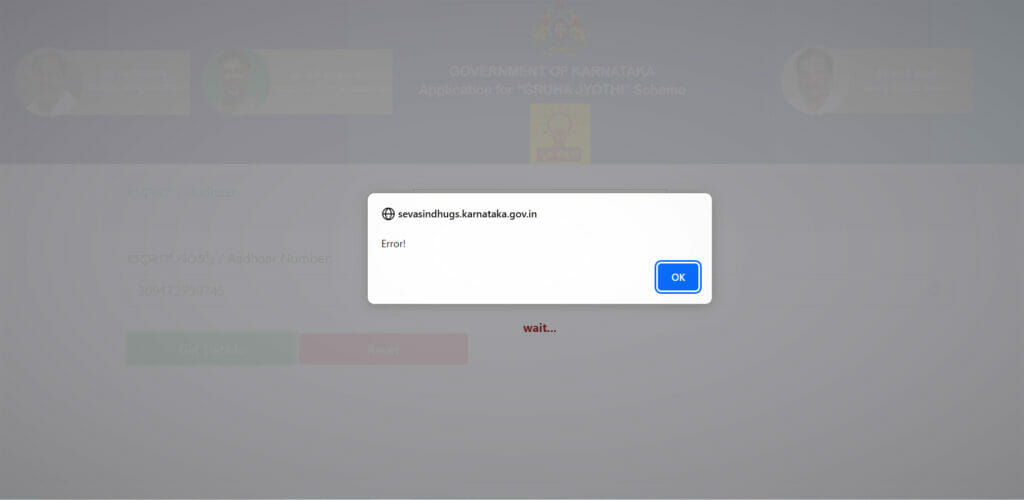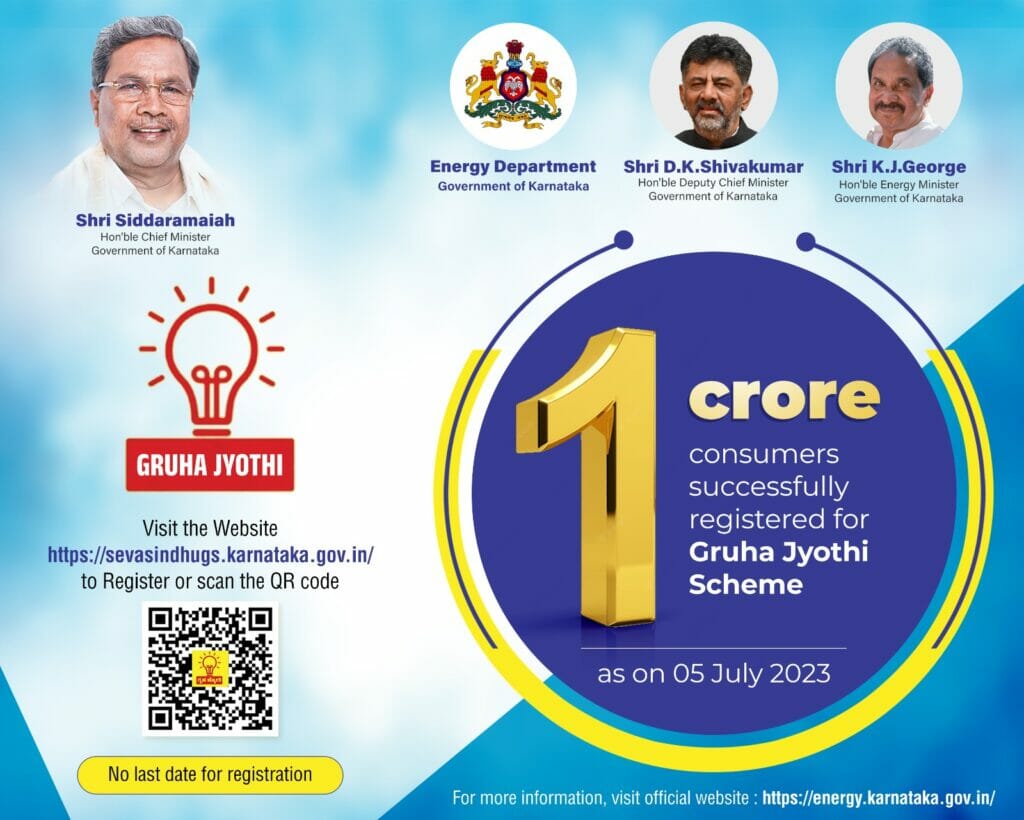The Gruha Jyothi or free electricity scheme appears to be extremely popular across the state. Over 1 crore people have registered for it , nearly 42 lakh from Bengaluru. But the process of registering is turning out to be challenging for many people.
Under the Gruha Jyothi scheme, households that consume less than 200 units of electricity will not have to pay the monthly bills. But to access these benefits, consumers must register on the Seva Sindhu Portal with their RR numbers and Aadhaar. The Ministry of Energy recently announced that there is no time limit for consumers to register for these benefits. However, the ministry advised consumers to register by the 25th of the month, for that month to be considered.
Seva Sindhu difficult to use
As I write this article, I have made my fifth attempt at registering on the Seva Sindhu Portal. Attempts 1 to 4 involved failing to cross the first barrier of entering the Captcha text. I typically got an error message followed by another about the site being busy. On the fifth attempt, I received an OTP and crossed the first barrier. I am currently stuck on the second page, where I am supposed to enter my personal details and the RR number on my electricity bill. The fields don’t work. I can’t type in anything.
Only two things keep me going. Fear of hearing the dreaded “I told you so” from my mother, who warned me to do it days ago. And my job, which requires me to test these things out for myself.
This is hardly my experience alone. Comments on social media accounts of the State energy minister KJ George and BESCOM show that the Seva Sindhu Portal is difficult to use.

Glitchy portal
One twitter user, Naveen Uttarkar, found the portal to be an unpleasant experience. “I had to try multiple times before I made it. In principle [the scheme] was well thought of, implementation was poor,” he says.
Overall, Naveen, who managed to register on his own, felt the scheme would burden energy companies He suggests that the government should instead focus on delivering high quality basic services, like education and healthcare.
Not everyone has the patience, time or the ability to understand the technological monster that is an Indian Government website. These citizens can go to the Bangalore One centers to register for the scheme. The problem is that Bangalore One staff grapple with the same technological challenges as ordinary citizens.
Crossing the digital divide
However, with the increase in electricity prices in Bengaluru, Gruha Jyothi assumes an added importance for other citizens, particularly, low income groups. Yashodha, a field worker with the Stree Jagruthi Samithi, an organisation working for domestic workers’ rights, says electricity is a major concern for domestic workers. “Both getting regular supply and being affordable are vital for the poor,” she says. “Electricity allows the children to study and do their homework. It allows women to watch something or talk on the phone after a long day of domestic work.” she says.
Many low-income families are unable to pay electricity bills every month. Prema*, a domestic worker in North Bengaluru, pays her electricity bill once in two months. She typically incurs a bill of Rs 150-Rs 200, but often must prioritise her children’s school expenses or medicines over the bill. The news of the scheme was a joyous moment for her. But implementation was a challenge. “I don’t know how to read and write. My oldest daughter has a [smart] phone, but she also found it difficult to register.”

“It was difficult during college hours for me to register,” says Prema’s daughter. “You have to try many times. In the evening I tried at home. But I don’t have too much data also,” she adds. For Prema, going to the Bangalore One centres was difficult. “I work from 7 am to 6 pm. Then I have to cook and take care of the younger children.” She also admits that she finds the Bangalore One centres intimidating.
Yashodha helped several people register from the Stree Jagruthi Samithi office, but even she found the Seva Sindhu portal a challenge. Several domestic workers also complained to her that they struggled with the long lines at Bangalore One and Seva Sindhu centres in South Bengaluru. “For any citizen, waiting hours to register is a challenge. But domestic workers can lose their jobs, if they miss work,” Yashodha points out.
At a Bangalore One centre in Yelahanka, Priya, a college student, is waiting in line for the second day for registration. “It [registration] almost got done last time, but the portal crashed in the last minute. They [Bangalore One staff] told me to come back. So, today I have come early,” she says.
We have contacted the Directorate of Electronic Delivery of Citizen Service (EDCS), the department in charge of the Seva Sindhu portal and Bangalore One centres. This story will be updated if they respond.
Read more: Explained: Did the Karnataka government really increase electricity rates by Rs 2.89 per unit?
Middlemen as middle ground
To avoid the long lines and hassles of registering on their own, Prema’s daughter has found a third solution: An agent. “There is one uncle who has a xerox shop. He did it for us,” she says. The uncle, Jayakumar, owns a printing shop. But Jayakumar also runs a business helping citizens apply for documents like Passports, PAN cards, etc. He sidesteps the question of whether he is authorised.
Centres like Bangalore One were established to route out middlemen while helping citizens access essential government services. However, these middlemen do not seem to be going anywhere. Many citizens desperate to register before July 5th, which was the previously announced deadline, have turned to third party agents. Although the government dropped the deadline, many citizens don’t seem to know about this.
Read more: Study explores best practices to save electricity in Bengaluru’s apartments
Sarasamma, a pourakarmika living in Jallahalli, was worried she would miss the deadline. “My current bill was Rs 800 this month [June] for just the three of us,” she says. “How can I afford it? I went to a xerox shop,” she says. These agents largely seem to be running photocopy shops, printing shops or internet cafes. Businesses that likely give them internet access and literacy, not to mention the patience needed for the task.
Sumathi*, a xerox shop owner in Rajajinagar, has been registering residents around her shop for a while. Most of her clients are middle class senior citizens, she says. “I typically charge Rs 300. But if they look poor, like domestic workers or security guards, I tell them to give less. Maybe Rs 50.” Jayakumar in North Bengaluru typically charges Rs 100 for the registration, but he didn’t charge Prema’s daughter. “She’s a kid after all. It is not a big loss for me to help her,” he says, smiling.
Yashodha feels marginalised citizens, who need the benefit, could have avoided the hardship if the process was simpler. “At least BESCOM staff could collect the information. At least for elderly citizens, BESCOM staff could have collected the information.” As for me, as of filing this story, I am on to my sixth attempt of registering and avoiding my mother’s calls.